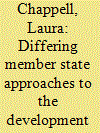|
|
|
Sort Order |
|
|
|
Items / Page
|
|
|
|
|
|
|
| Srl | Item |
| 1 |
ID:
098420


|
|
|
|
|
| Publication |
2009.
|
| Summary/Abstract |
This article will analyse the challenges facing the Common Security and Defence Policy (CSDP) through an evaluation of the impact that differing member state strategic cultures have on the EU Battlegroup Concept, highlighted through the examples of Germany and Poland. The concept was initiated to give the EU an increased rapid reaction capacity. However, as emphasised through the cases of Germany and Poland, divergences in EU member states' strategic cultures remain, including when, where and how force is used. When this is combined with the cost of plugging military capabilities' gaps, the political willingness to deploy a Battlegroup can be affected. Whilst the article highlights that the role that member states want to play within CSDP as well as international expectations can override constraining factors, the Battlegroups rely on a rotation system. As some member states are more willing to deploy the Battlegroups than others, the concept risks becoming a declaratory policy thus undermining CSDP.
|
|
|
|
|
|
|
|
|
|
|
|
|
|
|
|
| 2 |
ID:
114605


|
|
|
|
|
| Publication |
2012.
|
| Summary/Abstract |
This article seeks to return to the question of an EU military capability
and assesses the organisations capacity for military action through an
analysis of the work ongoing in the European Defence Agency and the
prospects for practically utilising Permanent Structured Cooperation. It
highlights that the introduction of Permanent Structured Cooperation
can be seen as an opportunity for the EU Member States to ?nally
begin to address their capability gaps. Whether signi?cant change actually materialises will depend upon how such a mechanism is implemented in practice. Several factors pose major challenges: lack of
suf?cient political will to practically employ the Battlegroups, static or
declining defence budgets, unwillingness among the Member States to
pool capabilities and the lack of a fully ?edged European strategic culture. By applying the concept of strategic culture this article seeks to
analyse these complex dynamics and uncover the possibilities for bringing a new impetus behind defence cooperation within the Common
and Security Defence Policy.
|
|
|
|
|
|
|
|
|
|
|
|
|
|
|
|
| 3 |
ID:
098388


|
|
|
|
|
| Publication |
2010.
|
| Summary/Abstract |
Despite its accomplishments, development of ESDP requires more than the leadership of France, Germany, and the United Kingdom. This is especially significant for overcoming divergence between 'old' and 'new' member states. As a vocal, medium-sized country, the largest of the new EU members, Poland, has special potential to influence ESDP. This article analyses continuity and change in Poland's security and defence views. It highlights beliefs, attitudes and norms shaping policy-makers' conceptions towards defence issues, stressing role theory. Poland initially reacted sceptically to the creation of ESDP, but its policies changed after 1) transformation of the international situation following 11 September, 2) international expectations of Poland to enhance its military role, and 3) Poland's desire to be a reliable European and transatlantic ally. This is despite the fact that Polish threat perceptions and immediate defence concerns are focused on its own neighbourhood, not the larger region or out of region. Polish acceptance of ESDP highlights the beginnings of a European strategic culture can be seen, despite divergences with other members, particularly over Russia. Poland's original scepticism has not just been replaced by pragmatism but also activism and potential leadership. Poland's positive approach offers a model for other member states to increase their contributions, turning ESDP into more than a German, French, and British exercise.
|
|
|
|
|
|
|
|
|
|
|
|
|
|
|
|
| 4 |
ID:
173744


|
|
|
|
|
| Summary/Abstract |
The EU has been a key actor in shaping European gender regimes in post-war Europe. There is a substantial amount of work on the role of the EU as a gender actor, particularly in employment and social policy. The adoption of and consistent referral to equality as a fundamental value of the EU raises important questions about the way the EU promotes ‘soft’ values in an international setting, through its security and defence policy, particularly as the EU is trying to promote itself as a normative actor. Hence, this article sets out to analyse where gender equality, as a policy frame, is located within the European External Action Service (EEAS). Through an investigation into whether the core normative principles of gender equality and mainstreaming have permeated this policy domain, we then focus on how the EEAS reflects the EU’s gender regime, which is informed by Walby’s framework, and how this shapes mainstream security and defence policies. We find that the neo-liberal foundations of the EU permeate the way the EEAS incorporates the principle of equality, leading to a shallow understanding that focuses on adding women into existing structures.
|
|
|
|
|
|
|
|
|
|
|
|
|
|
|
|
|
|
|
|
|